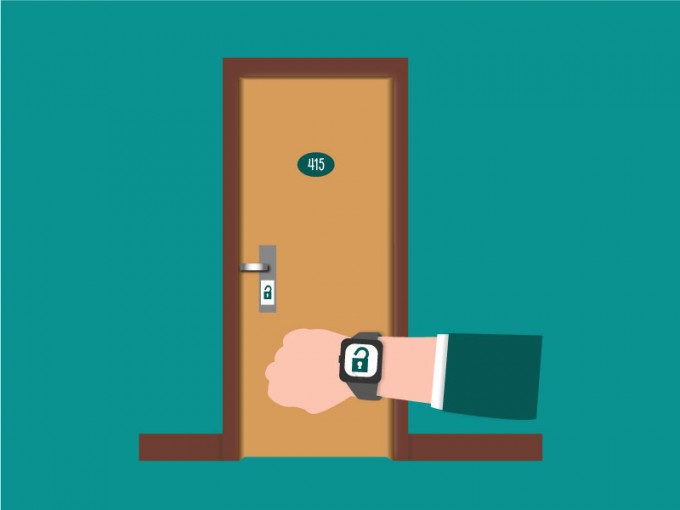<

Like the world around us hotels are continuing to change and evolve, these transformations are largely related to technology advances and have resulted in a new era of hotels to emerge. It’s not enough for hotels to simply provide a comfy bed & buffet breakfast, to keep up with the changing times they need to embrace technology and enhance the customer experience. We take a look at what hotels have in store for us with examples of those which have already implemented innovative technology.
Increased smartphone functionality
Now that as a society we have trouble being separated from our smartphones, hotels are adapting how they connect with us during our stay. Many hotels are in the process or already have introduced their own app for guests to download when they initially check in. Apps already being utilised offer a range of services ranging from the simple on screen alternative to the guest information book to the more complex apps which allow guests to adjust their room temperature and communicate with hotel staff. Ordering room service via a hotels app has become increasingly popular with one hotel even introducing room service ordering via text message and emojis. The Aloft Hotel in New York’s financial district hotel devised an emoji menu with items like the ‘Munchies’ package which sees guests receive Doritos, snickers and a brownie by texting candy emojis to hotel staff. As smartphones continue to gain functionality there are endless possibilities for how hotels can take advantage of our smartphone addiction.
Integration
Innovations for the future hotel aren’t solely focused on the customer facing aspects, they’re also about streamlining operations for staff. Staff want and need one integrated solution which connects systems and people to fully unify communication throughout the hotel. The nature of hotels means that different departments are scattered across the hotel grounds, making efficient communication difficult. This becomes especially problematic when guests have urgent requests or an issue arises where all staff need to be notified at once. As the solution to strained communication hotels have begun using a unified messaging and alarm monitoring software. The software is not only a simple way to send messages but connects with every kind of alarm, including security systems, fire alarm panels and lift alarms to ensure the highest level of safety. One such solution, Gen2, used by Handpicked Hotels allows users to quickly communicate with staff no matter where they are in the building. For example, the concierge can easily alert the floor 3 housekeeper that room 12 would like extra towels, without having to pick up a phone and call. The future hotel is all about efficiency and a messaging and alarm monitoring software is the perfect solution.
Self check-in kiosks
After a long journey the last thing guests want to do is wait in a long line at reception to check in, self check in kiosks are the perfect alternative and offer a range of other benefits. Check in kiosks ensure customer information is spelt correctly, as they are entering it themselves, presents the opportunity to generate additional revenue by automatically offering room upgrades and gives reception staff free time to complete other tasks. Although there are fears that check-in kiosks dehumanise the experience the kiosks simply offer choice. For example, some larger Premier Inn hotels have installed check in kiosks but maintain the traditional reception desk as well, giving their customers the choice on how they would like to check in. The added value and choice self check in offers will ultimately result in kiosks appearing in hotels everywhere.
Virtual tours with virtual reality
Virtual reality is giving guests the opportunity to view hotel rooms, lobbies and amenities before even stepping foot in the door. Last year, Best Western Hotels & Resorts paired with Google Street View to develop an experience for virtual reality headsets. The reality experience uses 360-degree view videos to show guests exactly what to expect and was introduced with the booking process in mind, hoping that what customers saw during the VR tour would encourage them to reserve. Other hotels have introduced VR headsets to room service to show guests what local activities and attractions look and feel like. As the possibilities of virtual reality continue to expand hotels will have greater mechanisms to engage with guests, as long as they keep up with the technology.
Connecting with chatbots
The use of chatbots, computer programs which mimic conversation using artificial intelligence, within the hotel industry is still relatively new and is continuing to evolve. Currently their use focuses on the customer service aspect such as providing booking enquiries, general travel advice and pre/post stay information. Last year Edwardian Hotels launched their chatbot service with virtual assistant, Edward. Edward’s skills include giving directions within the hotel, taking housekeeping requests and registering complaints. As chatbots continue to evolve its likely that the boundaries between humans and bots will become blurred and that artificial intelligence will play a much larger role in your hotel stay. In the near future an in room smart speaker will be giving your 10am wakeup call or making your dinner reservation rather than staff manning the reception desk.
Wearable Tech
Although wearable technology isn’t a new concept it has become an everyday aspect of many people’s life thanks to smart watches and fitness trackers, such as Fitbit. Wearable’s are now more widely used than ever and are becoming an element of the guest experience. A simple wearable band easily replaces the traditional room key or key card and, those more complex, can offer additional functions such as cashless payments and the ability to book a table at the hotel restaurant. Walt Disney World and Resort has lead the way for the wearable tech experience with a one-billion-dollar investment throughout their hotels and parks. Disney World’s MagicBand system gives park goes a way to pay at gift shops and restaurants without cash as well as gives hotel guests access to their rooms and more. Other hotels are using similar bands to distinguish luxury guests by giving them access to exclusive parts of the hotel. The diverse nature of wearables gives hotels endless opportunities to take advantage of the technology which is sweeping over the world.
